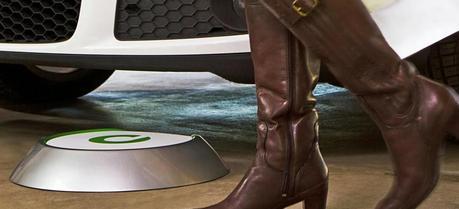 A Plugless Power parking pad. (Credit: Plugless Power)
A Plugless Power parking pad. (Credit: Plugless Power)Idaho National Laboratory (INL) researchers recently released independent testing results of a wireless EV charging system designed for plug-in electric vehicles (PEVs). With this system, drivers of electric vehicles may only need to find a parking space and park to begin charging their batteries.
The system tested, Evatran’s Plugless Level 2 Charging System, uses inductive technology to wirelessly charge a PEV’s traction battery, which powers the vehicle.
“Technology in the electric vehicle market continues to evolve quite rapidly,” said Jim Francfort, INL’s principal investigator for advanced technology vehicles.
“Our researchers performed 2,600 separate tests of Evatran’s Plugless Level 2 Charging System, which included testing at different distances and varying alignments,” he said.
INL continues to conduct independent testing of PEVs and wireless EV charging systems. The Plugless system is the first wireless power transfer technology to be independently documented and published.
The tests, which documented efficiency results, magnetic and electric fields and overall system performance, are available online. Evatran supported the testing process with engineering input.
Normally, PEV owners must charge their vehicles by using a power cable that connects the vehicle’s charging port to external electric power supply equipment. The Plugless system allows a driver to simply park in a designated parking location over the charging coil, which is either installed on the ground or embedded under the surface, to start the charging process.
In addition to avoiding the plug-in process, the Plugless system includes parking guidance technology that directs the PEV driver toward optimal alignment and foreign object detection technology to protect against ferrous materials.
“This emerging technology offers the potential for much higher charging participation resulting in more electric miles being driven, helping to reduce our nation’s dependency on foreign oil,” Francfort said.
INL is expected to continue testing wireless charging technologies with industry participation. Industry, DOE and INL are also conducting research into dynamic vehicle charging technologies that will use wireless power transfer technologies for possibly charging vehicles while they are driven on roadways (a technology that would allow to charge an electric car on the go with a help of a contact rail is currently under development in Europe).

